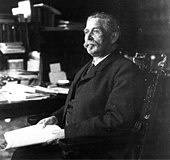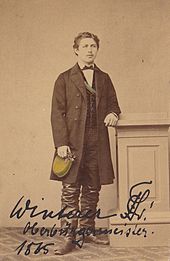Otto Winterer
Otto Winterer (born January 8, 1846 in Ettenheim , Ortenaukreis , † February 26, 1915 in Freiburg im Breisgau ) was Lord Mayor of the cities of Constance and Freiburg im Breisgau.
Life
Otto Winterer, son of a baker, passed his Abitur at the Berthold-Gymnasium in Freiburg and then studied law and political science at the universities of Freiburg and Heidelberg. Winterer was a member of the Corps Suevia Freiburg .
After the state examination in 1871, he entered the Baden state service, was appointed bailiff in Mannheim in 1874 and in 1876 as chief bailiff of the Buchen district office . On April 4, 1877, at the age of 31, he was elected by the Citizens' Committee of the City of Konstanz as the successor to the resigned Max Stromeyer as the new Lord Mayor, where he was particularly successful as a renovator of the then shattered urban finances. From 1883 to 1889 Winterer was an elected member of the constituency of Constance in the Second Chamber of the Baden Estates Assembly and belonged to the faction of the National Liberal Party . In May 1888 he was elected Lord Mayor of the city by the Freiburg Citizens' Committee.
In 1905 Winterer was elected to the First Chamber of the Baden Estates Assembly as a representative of the Baden cities, which he remained until his death.
When Winterer left office in 1913 after a 25-year term in office, people in Freiburg spoke of the “second founder of the city”. During his tenure, the number of residents and buildings in Freiburg doubled. He initiated the new construction of the city theater , the establishment of the city collections , the new town hall, the new college building of the Albert Ludwig University of Freiburg and the development of new parts of the city such as the Stühlinger . For wealthy new citizens, those who fled before the Hamburg cholera epidemic of 1892 or pensioners from the Ruhr area , he had upscale residential areas in Herdern and on Lorettoberg (in the Wiehre ) developed.
Important infrastructure facilities were also fundamentally renewed or created under his leadership: new schools for the rapidly growing population, water supply, sewage disposal on the Rieselfeld, power station, tram and much more. He also recognized the potential of Freiburg with regard to the emerging tourism and had panoramic trails in the city forest, the park around the forest lake and other leisure facilities laid out.
He was also very interested in the history of the city and campaigned vehemently for the preservation of the remaining city gates ( Martins and Schwabentor ), which he had significantly increased in the taste of the time. When asked by the citizens to tear down the city gates due to complications in the construction of the tram, he replied: “The village has roofs - the city has towers.” In addition, the preservation of the Freiburg Minster was a particular concern of his: he was the initiator of the establishment of the Freiburg Minster Association .
Honors
After living with his family in an official apartment in the town hall for the entire term of office, he moved into a house in Wintererstrasse in Herdern, which was named after him. A street was also named after him in Konstanz.
The medical faculty of the University of Freiburg awarded him an honorary doctorate for the construction of the sewer system . He was an honorary citizen of Konstanz (September 12, 1888) and Freiburg (May 24, 1913). In addition, the Winterer Stadium existed in Freiburg in the 1930s, where SC Freiburg played for a few years before it was demolished.
After a renovation in 1998, the upper foyer of the Freiburg theater can be used for events. Since then it has been called the Winterer Foyer; the original theater building was erected in 1905 during Winterer's tenure.
family
Otto Winterer's son, Wilhelm Winterer (1879–1969), was an officer in the Schutztruppe for German East Africa , a sponsor of the Freiburg Museum for Nature and Ethnology (now the Museum Natur und Mensch Freiburg ) and an author and publisher of colonial revisionist writings.
literature
- Heinrich Müller: Lord Mayor Dr. Otto Winterer. A quarter of a century of development in the city of Freiburg . Dinger, Freiburg 1916.
- Anton Müller: Dr. Otto Winterer. Lord Mayor of the City of Freiburg i. Br . In: Ekkhart 1965, pp. 161-173.
- Wolfgang Herterich: Dr. Otto Winterer. Freiburg's great mayor 1888–1913 . In: Freiburger Almanach 43, 1992, pp. 57-64.
- Renate Lissem-Breinlinger: On the biography of Dr. Otto Winterer (1846–1915). In: Schau-ins-Land: Annual issue of the Breisgau history association Schauinsland, issue 111.1992, pp. 129–140 digitized
Web links
- Entry Winterer, Otto on Discover regional studies online - leobw.
- Speeches by Otto Winterer in the Baden state parliament in the digital collections of the Badische Landesbibliothek
Individual evidence
- ↑ Michael Klant: Forgotten Sculptors In: Sculpture in Freiburg. 19th century art in public spaces , modo, Freiburg im Breisgau 2000, ISBN 3-922675-77-8 , p. 172.
- ↑ Press releases of the city of Freiburg: The village has roofs - the city has towers: Exhibition in the Museum of City History ( page no longer available , search in web archives ) Info: The link was automatically marked as defective. Please check the link according to the instructions and then remove this notice. , Accessed June 30, 2012
- ↑ stadien-in-baden-wuerttemberg.de: Winterer Stadium, Freiburg , accessed on December 1, 2012.
- ^ Heiko Wegmann: The Freiburg colonial officer and author Wilhelm Winterer , online at: freiburg-postkolonial.de, article from July 21, 2006 (last updated on April 20, 2011).
- ↑ Heiko Wegmann: Freiburg: Traces of the Colonial Movement, in: Ulrich van der Heyden and Joachim Zeller (Eds.): Colonialism here in Germany - A search for traces in Germany. Sutton Verlag, Erfurt 2007, ISBN 978-3-86680-269-8 , p. 61 ff.
Web links
- Literature by and about Otto Winterer in the catalog of the German National Library
| predecessor | Office | successor |
|---|---|---|
| Max Stromeyer |
Lord Mayor of Konstanz 1877–1888 |
Franz Weber |
| Carl Schuster |
Lord Mayor of Freiburg im Breisgau 1888–1913 |
Emil Thoma |
| personal data | |
|---|---|
| SURNAME | Winterer, Otto |
| BRIEF DESCRIPTION | Lord Mayor of the cities of Constance and Freiburg |
| DATE OF BIRTH | January 8, 1846 |
| PLACE OF BIRTH | Ettenheim |
| DATE OF DEATH | February 26, 1915 |
| Place of death | Freiburg in Breisgau |



